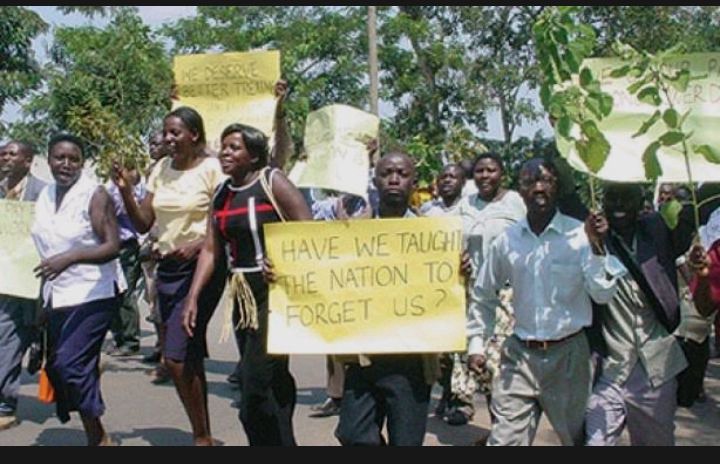A storm of discontent is sweeping through Uganda’s education sector as more than 10,000 arts and humanities teachers have laid down their tools, protesting against glaring salary disparities and what they describe as government betrayal.
The strike, which began in early June, has seen secondary school teachers from across the country abandon classrooms, leaving thousands of students stranded in the middle of the academic term.
The teachers, who specialize in subjects such as history, literature, and religious studies, accuse the government of sidelining them while prioritizing science-based educators in its remuneration structure.

At a tense meeting held on June 1, 2025, at Soroti Secondary School, the teachers voiced their frustration, demanding that the government fulfill its promise of equitable salary enhancements for all educators.
“We are not second-class citizens. We contribute equally to the intellectual growth of this nation,” said James Okello, a senior literature teacher from the Eastern Region.
In 2022, the Ugandan government implemented a controversial salary increment for science teachers, doubling their earnings while leaving arts teachers behind.
Despite several rounds of negotiations and assurances from officials, the arts teachers say their concerns have been continuously ignored.
This latest strike marks a boiling point in long-simmering tensions between arts educators and the Ministry of Education.
“We were patient, but patience has limits. We have families to feed too,” said Sarah Nambasa, a history teacher who has served for over 15 years.
The Uganda National Teachers’ Union (UNATU) has thrown its weight behind the strike, urging the government to engage in meaningful dialogue before the situation worsens.
UNATU General Secretary Filbert Baguma stated, “The discrimination is not only demoralizing but dangerous for the future of education in Uganda.”
Meanwhile, the Ministry of Education has called for calm and assured that discussions are ongoing. However, many teachers say they have lost faith in empty promises and want action, not words.
With national exams drawing closer and thousands of students left without instruction, the ripple effects of the strike are already being felt across the education system.
Unless resolved swiftly, Uganda risks a deepening crisis that could cripple its academic calendar and further strain teacher-student relations in the long term.
